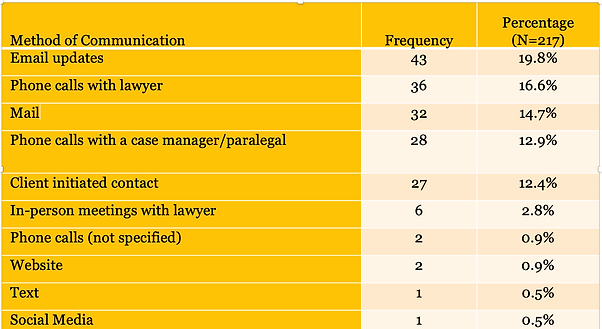Elizabeth Chamblee Burch
Results
Who are the 217 Participants?
-
Demographics
-
Race: 73% white, 2.3% Black, 2.3% multi-racial, American Indian 0.9%, Pacific Islander 0.5%
-
Gender: 77.9% of participants female (expected given our focus on women’s health MDLs)
-
Education: 40% high school or GED, 26% college degree, Master’s 7.8%, doctoral degree 1.8%
-
Geography: 42 different states
-
Courts: cases originated in 32 different state and federal courts
-
Attorneys: represented by 295 different attorneys from 145 firms
Is the study representative?
-
We don't know. This study is the first of its kind and no database of MDL plaintiffs exists for comparison purposes.
-
Yet, it is noteworthy that our 217 plaintiffs lived in 42 different states and had diverse backgrounds, educations, and races. Their cases originated in 32 different state and federal courts, and 295 lawyers from 145 law firms represented them.
Key Empirical Findings
-
Most of our participants (168) indicated hiring a lawyer, but less than half (48%) could provide their attorney's name.
-
Slightly more (63.5%) could recall the name of their law firm.
-
Only 19% were able to identify whether their attorney served as a leader in their MDL.
-
50.6% could not identify where their lawsuit was pending.
-
69.1% could not identify the name of the judge assigned to their case.
-
Overall, only 1.8% felt like their lawsuit accomplished what they hoped it would.
Plaintiffs & Their Lawyers

Plaintiffs' Reasons for Suing
Most often plaintiffs wanted to prevent the same harm from happening to other people, but compensation (either for medical expenses or generally) was very important as was holding companies accountable.

Overall Satisfaction with Attorneys
77% of respondents hired counsel, but more than half were somewhat or extremely dissatisfied with their lawyer.

Why were Plaintiffs Unhappy with Attorneys?
Though 54% agreed they had a chance to explain their situation to their lawyer and 45% felt like their attorney explained fees and costs, 60% disagreed their lawyer kept them informed, more than two-thirds felt like they didn't understand what was happening with their case, 49% didn't feel like the attorney explained the risk and benefits of key decisions, and 51% didn't trust their lawyer to act in their best interest.

Lawyer Client Communication Methods
Only 16.6% reported speaking personally with their attorneys at all and 12.4% volunteered that they were tracking down their lawyers to find out what was going on, often without luck.
How Did Plaintiffs Find their Attorneys?
Most plaintiffs found their lawyer through advertisements, whether on TV, internet searches, or billboards.

Plaintiffs & the Courts
Plaintiffs Cases Lasted Too Long
Most participants' lawsuits lasted 5-6 years, but some lasted even longer, up to 11 years in some cases.
Nearly three-fourths said the delay was unreasonable.
We heard comments like:
-
“My suit has been filed for 7 years. I am 15 years injured.”
-
Another said, “In the over 5 years that have transpired since we file[d] our lawsuit, we have NOT received a trial date. This litigation process is simply broken. The pain and suffering of the many lives trapped in this maw deserve justice and yet, we wait. Justice Delayed, Justice Denied.”

But They Wanted To Tell Their Story
Surprisingly, 60% of respondents said they would wait even longer, an average of a year and a half more, though some up to FIVE years longer, if it gave them an opportunity to tell their story.
Only 4.1% said telling their story wouldn’t be worth the wait


Plaintiffs Had No Idea When Hearings Occurred
Only 3 attended a hearing and most didn't because they weren't aware they could. Distant forums and the cost of travel made it hard, and some were told the proceedings weren't open to them.
Why Were Hearings So Hard to Attend?
Home States vs. MDL Proceedings

Treatment by MDL Judges
-
51% disagreed the judge had the necessary information
-
41% disagreed the judge relied on accurate information
-
49% disagreed the judge explained rulings and opinions
Respondents were more neutral on being treated with respect and feeling the judge encouraged them to settle.

Plaintiffs & Outcomes

Plaintiffs' Dissatisfaction with Settlement Process
75% of respondents were extremely dissatisfied with the settlement process.

Why?
Less than half knew anything about how their claim would qualify; what their lawyer’s fees would be; how much they would receive in settlement; how much other clients would receive.
Respondents did not feel they had a chance to tell their side; that the claims administrator had the necessary information or relied on accurate information; or that decisions were explained.

Outcome Dissatisfaction
Participants overwhelmingly felt like their litigation goals had not been achieved. A mere 1.8% of all participants indicated that their lawsuit achieved what they hoped it would, with 67.2% saying it had not and 10.6% saying “maybe.”
The chart to the left explains why.
Five Steps for Improving MDLs
1. Adequate representation. Given the reality of individual counsel, MDL judges should consider conflicts of interest in selecting lead lawyers.
2. Technology. Judges should make courts more accessible through that would allow parties to watch proceedings from their homes and participate at key points.
3. Group Communication. Courts and lead lawyers should set up online groups or forums where plaintiffs can exchange information with one another and communicate with lead lawyers without endangering their attorney-client privilege.
4. Attorney Evaluations. MDL judges should ask plaintiffs to evaluate judicially appointed lead lawyers and encourage lawyers to communicate regularly with clients.
5. Ethics. Both state bars and MDL judges should take plaintiffs’ complaints about their attorneys’ ethical failing seriously and sanction and discipline individual lawyers when appropriate.


